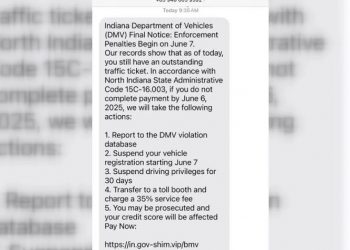Indianapolis, Indiana – The Department of Health and Human Services appears to be the source of a false government grant scam that the Federal Trade Commission is alerting customers to.
The FTC warning claims that the scam is immediately accompanied by a number of significant red flags. First and foremost, you should be wary of the scammer’s communications. The con artist will approach you about a grant you didn’t apply for and then demand payment for more information. They will pose as representatives of HHS. Yikes!
Although that could seem like a blatant deception, the Office of the Inspector General points out that the con can appear plausible to someone who isn’t vigilant against fraud. The OIG claims that the con artists will utilize a variety of social media channels to lure you to phony websites with live chat rooms and customer service. They will start requesting personal information and payment information once they have you convinced that they are real in order to “process” the award.
If it reaches that point and you voluntarily provide the data they request, you have been duped. Remember that banks and credit card providers are often decent at returning money that has been fraudulently taken. You have a significantly lower chance of getting your money back if you are duped into parting with it.
Remember that Health and Human Services and other government organizations won’t call you unexpectedly about a grant you didn’t apply for if you want to avoid falling for this scam. Furthermore, HHS will never charge you for grant applications or additional information. Websites run by the government finish with “.gov.” You’re being taken to a bogus website if it ends in.com ,.org, or.us.
On the websites of the FTC and OIG, you can read more about this con as well as information on how to prevent it and report it.




















































































